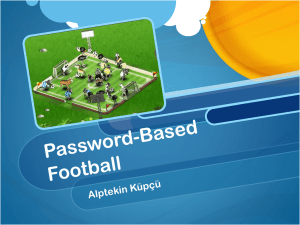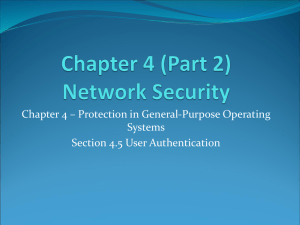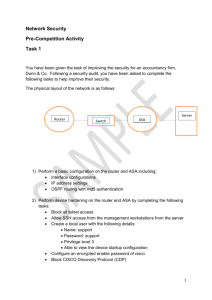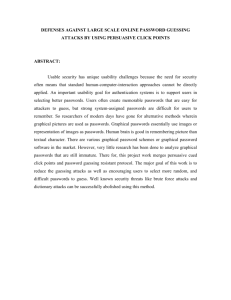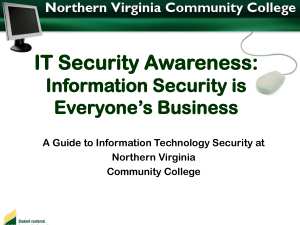Using Technology Responsibly
advertisement
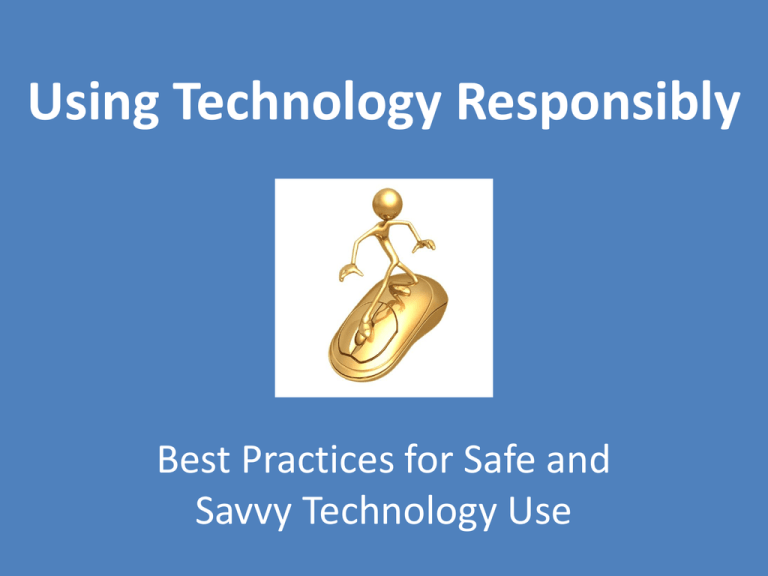
Using Technology Responsibly Best Practices for Safe and Savvy Technology Use Why Become Tech-Savvy? • College students rely heavily on technology for both academic and non-academic purposes Laptops Tablets Netbooks E-Readers MP3 Players Smart Phones Assistive Technology Devices • Near-constant access to technology • Need to accomplish many tasks online • Skills are more than just how to use it; need to be truly savvy about technology Why do you use technology? A Double-Edged Sword • Technology is so well-integrated into daily life that we may not realize its extent • Pros: convenience and efficiency Cons: dependence and vulnerability • Technology’s benefits usually outweigh its risks • However, serious problems can arise if you’re not safe and savvy when using technology Types of Technology-Related Risks • Security Issues • Safety Issues • Privacy Issues • Data Integrity Issues If You Post It, They Will Find It • Anyone can find a lot of information about you online. • All it takes to find many details about you is… –The motivation and persistence to look for them –A small amount of prior knowledge about you • If you are careless about online safety and security, they may also be able to access more sensitive or private information about you What Can I Find Out About YOU? • Where you go to school • Who your friends are • Your favorite sports teams • What kind of car you drive • Where to find you on Tuesday evenings • Your sexual orientation • What you did last Saturday night • Your favorite songs • Where you work • What you want for your birthday • Where you live • Illegal activities you’ve participated in • Who your roommates are and whether you get along • Who your family members are • Your favorite movies • Your birthday and age • What causes/issues you • Your opinion of your teachers support • Your political views • Where you shop • The brand of pizza you prefer • Your sense of humor • Where you are and what • The people you admire you’re doing right now • Where & when you’re going • What you think of your boss on vacation • Items you own and items you • What you’re looking for in want to purchase a significant other • How you’re doing in school • Which websites, books, and magazines you read • What you look like • And much more… Where Can I Find All This Information? • Social networking sites Facebook, Twitter, Google+ • Wish lists/registries Amazon, Target, eBay • Blogs Blogger, Tumblr • File-sharing sites BitTorrent • Personal websites • Entertainment sites/services Hulu, Netflix, Goodreads • Photo/video sites YouTube, Instagram • Dating sites eHarmony, Match.com • Online video games Xbox Live, Steam • Message boards Any website with this feature • Employment-related sites Monster, CareerBuilder • Business sites Craigslist, Etsy, Roommates • Other Can you think of additional online resources where you may inadvertently be sharing more than you realize? Potential Consequences of Irresponsible Technology Use • Disciplinary action from colleges/universities • Losing a scholarship or athletic eligibility • Stalking • Use of posted information as incriminating evidence in legal matters • Identity theft • Being passed over for a new job or internship • Disciplinary action from an employer, including getting fired How can you deal with the risks inherent in using technology? You can’t ignore the risks, but you also can’t avoid technology entirely. The solution is to become “web wise” and technologically-savvy. From “Street Smart” to “Web Wise” • “Street smart” people… –Possess strong common sense –Have good instincts –Develop strong critical thinking skills –Are aware of their environment, including the risks it may pose –Use their skills to make good decisions and minimize risks • “Web wise” is the internet version of “street smart” Becoming “Web Wise” and Tech-Savvy • Understand that being tech-savvy is about more than knowing how to use technology • Learn about technology-related risks • Take steps to avoid or minimize risks • Take responsibility for your role as a member of the online community by being a good cyber-citizen • Apply critical thinking skills and good judgment to all your technology-related actions Tips for Becoming a “Web Wise” & Tech-Savvy College Student Keep a Clean Machine • Use reputable security software and ensure that it scans for threats regularly – Anti-virus – Anti-malware – Anti-spyware • Don’t bypass or disable security protocols • Keep security software up-to-date • Protect all devices that connect to the internet • Don’t forget about external devices like flash drives Connect with Caution • Access Wi-Fi hotspots wisely –Pay attention to the networks you connect to –Set tighter privacy controls for public networks –Don’t conduct sensitive business on public Wi-Fi • Make sure you’re using secure sites for all financial transactions • Protect your accounts with strong passwords and additional identity-verification measures Create Strong Passwords • Minimum length of 8 characters • Include at least 3 different types of characters: Uppercase letters (A B C) Numbers (1 2 3) Lowercase letters (a b c) Symbols (@ & % * ? / + ~) • NO personal information e.g., pet’s name, significant dates, favorite teams, etc. • NO dictionary words or names • NO reverse-spelled words or common substitutions e.g., regrubeseehc, LuvDaPir@tez1, 3L!z@b3t4 Don’t Even Think About Using These Passwords… • password • 123456 • 12345678 • abc123 • qwerty • monkey • letmein • dragon • 111111 • baseball • iloveyou • trustno1 • 1234567 • sunshine • master • 123123 • welcome • shadow • ashley • football • jesus • michael • ninja • mustang • password1 These are the 25 “Worst Passwords of 2012” as compiled by SplashData, a company that makes password management software More Password Tips • Change passwords regularly • Use a different password for each account • Store passwords securely –Write it down and lock it up –Use a password manager • Do not share your password with anyone • Choose security questions and answers wisely Take Common-Sense Precautions • Check and customize your security and privacy settings • Never leave your technology unattended • Always remember to log out of accounts on shared or public computers • Don’t open, download, or click on anything that looks even remotely suspicious • Back up your data often and store it securely Share Safely on Social Media • Consider limiting others’ access to your social networking profiles • Don’t rely solely on privacy settings to protect your information • Make decisions about what to share (and what not to share) with a level head • Learn to evaluate your social media presence with a critical eye Be a Good Cyber-Citizen • Good citizenship – Becoming well-informed and educated – Respecting legitimate authority – Being involved and engaged to promote the welfare of the community and people within it – Treating your environment, yourself, and others with respect and helping those who need support as you are able • Good citizenship also applies to the global community as accessed through the internet Good Cyber-Citizenship • Understand your potential to impact others through your online actions • Respect laws and rules in cyberspace as you would in everyday life, including intellectual property rights • Treat others in the online community with respect – If you wouldn’t say or do it in person, don’t say or do it online – The “Golden Rule” of social networking: Post about others only as they would post about themselves – Consider your motives for posting about others The Bottom Line for Using Technology Responsibly THINK…! • …before you post • …before you act Ask yourself: • What are the risks? • Why am I doing this? • Would I want ________ to see this? • Do these actions/words portray me as I want to be perceived by others? Activity: You Are What You Post • Pretend that you are moving to a new city. • You’ve found a great 3-bedroom apartment, and you’re looking for 2 roommates to share it with. • You decide to go online and check out the “SpaceBookster” social networking profiles of a few people who have emailed you inquiring about your request for roommates. • Look at their profiles and use the “Social Networking Site Evaluation” worksheet to make notes about each. • Based on their profiles, select your “top 2” preferences to ask to move in. Be ready to discuss why you chose these people as potential roommates. This work is licensed under a Creative Commons Attribution-NonCommercial 3.0 Unported License.
